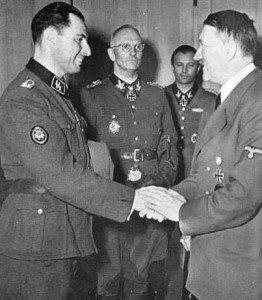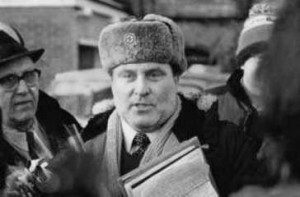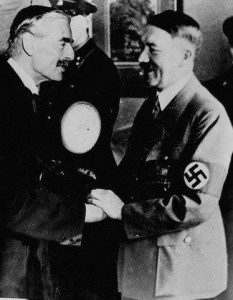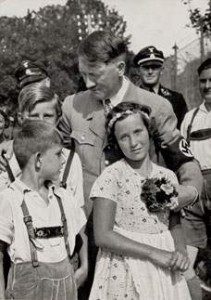 In this program, August introduces and reads an essay entitled, The Enigma of Hitler, by Leon Degrelle, which was published in The Journal for Historical Review in 1994. August begins by providing some basic details of the life of Degrelle himself, including his history as a Belgian nationalist, anticommunist, and future volunteer for the Waffen-SS. Decorated by and personally acquainted with Adolf Hitler, Degrelle argues that “the enigma of Hitler” has persisted in part because in spite of all of the volumes of historical writing and discussion on Hitler, few have discovered the real Hitler. The enigma of Hitler remains with us because of the extraordinary depth of Hitler himself, a fact taken in conjunction with a variety of myths about him. August concludes by reiterating a point he has already made on previous shows: That coming to positive terms with Adolf Hitler is a necessary precondition for any salvaging and rescuing of our race.
In this program, August introduces and reads an essay entitled, The Enigma of Hitler, by Leon Degrelle, which was published in The Journal for Historical Review in 1994. August begins by providing some basic details of the life of Degrelle himself, including his history as a Belgian nationalist, anticommunist, and future volunteer for the Waffen-SS. Decorated by and personally acquainted with Adolf Hitler, Degrelle argues that “the enigma of Hitler” has persisted in part because in spite of all of the volumes of historical writing and discussion on Hitler, few have discovered the real Hitler. The enigma of Hitler remains with us because of the extraordinary depth of Hitler himself, a fact taken in conjunction with a variety of myths about him. August concludes by reiterating a point he has already made on previous shows: That coming to positive terms with Adolf Hitler is a necessary precondition for any salvaging and rescuing of our race.
Image: Leon Degrelle being congratulated and decorated by Adolf Hitler.
Break music: “Memories of Sunlight” and “Memory” from The Road soundtrack.
Email: worldswomb AT gmail DOT com
Podcast: Play in new window | Download










 In the third program of An Hour by the Window, August discusses some aspects of the field of revisionism. He holds that revisionism’s principal antagonists can be divided into roughly two camps: Those that fall within the mainstream academic establishment and those that emerge within our own movement. He cites two examples, respectively, of each. Michael Shermer, Holocaust historian, embodies the former. Author Greg Johnson, a White nationalist, embodies the latter. Both fundamentally oppose Holocaust revisionism, but do so from very different points of view. The pro-establishment view rejects revisionism as pseudoscience, and the White nationalist rejection of revisionism rejects the revisionist enterprise as irrelevant to our cause.
In the third program of An Hour by the Window, August discusses some aspects of the field of revisionism. He holds that revisionism’s principal antagonists can be divided into roughly two camps: Those that fall within the mainstream academic establishment and those that emerge within our own movement. He cites two examples, respectively, of each. Michael Shermer, Holocaust historian, embodies the former. Author Greg Johnson, a White nationalist, embodies the latter. Both fundamentally oppose Holocaust revisionism, but do so from very different points of view. The pro-establishment view rejects revisionism as pseudoscience, and the White nationalist rejection of revisionism rejects the revisionist enterprise as irrelevant to our cause. In this program, August discusses one of the more contentious issues underlying the Good War myth: That what drove Adolf Hitler’s foreign policy was a desire to undermine the West, including the British Empire and the United States. He goes deeper into textual and historical material in search of Hitler’s actual attitudes toward the British Empire, the pivotal nation that a policy of presumed “world domination” would have to target. In fact, as was discussed on the first episode of this installment, Hitler sought an alliance with the British Empire, and neither a compliant and submissive ally nor an antagonist to his actual foreign policy aims, which were to unite the German people and secure their existence. In the second half of the show, August concludes that we must emphasize the racial dimensions of the impact of our World War II mythology above all, even if more mainstream revisionist and alternative views about the war may fail to strongly accentuate the underlying and important racial point.
In this program, August discusses one of the more contentious issues underlying the Good War myth: That what drove Adolf Hitler’s foreign policy was a desire to undermine the West, including the British Empire and the United States. He goes deeper into textual and historical material in search of Hitler’s actual attitudes toward the British Empire, the pivotal nation that a policy of presumed “world domination” would have to target. In fact, as was discussed on the first episode of this installment, Hitler sought an alliance with the British Empire, and neither a compliant and submissive ally nor an antagonist to his actual foreign policy aims, which were to unite the German people and secure their existence. In the second half of the show, August concludes that we must emphasize the racial dimensions of the impact of our World War II mythology above all, even if more mainstream revisionist and alternative views about the war may fail to strongly accentuate the underlying and important racial point. Sept. 19, 2012
Sept. 19, 2012